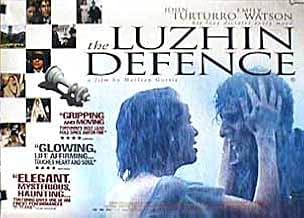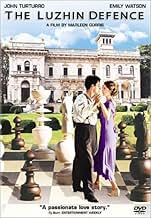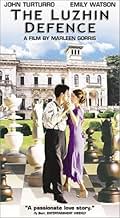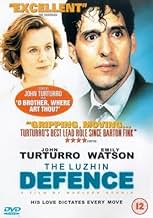AVALIAÇÃO DA IMDb
6,8/10
4,9 mil
SUA AVALIAÇÃO
Adicionar um enredo no seu idiomaTwo worlds collide when an eccentric genius falls in love with a strong-willed society beauty.Two worlds collide when an eccentric genius falls in love with a strong-willed society beauty.Two worlds collide when an eccentric genius falls in love with a strong-willed society beauty.
- Direção
- Roteiristas
- Artistas
- Prêmios
- 3 vitórias e 2 indicações no total
- Direção
- Roteiristas
- Elenco e equipe completos
- Produção, bilheteria e muito mais no IMDbPro
Avaliações em destaque
Part of the enjoyment that I took from this film stemmed from the fact that I knew nothing more about it than that it starred John Turturro and Emily Watson (2 reasons enough to watch), was a period piece and involved chess. Everything that evolved before me was completely unexpected. I shan't, therefore, give away much more. Suffice to say that Turturro is magnificent as an eccentric, obsessive and deeply vulnerable chess genius and Em matches him step for step as the strong-minded woman who is drawn to him. It's about love and obsession, rather than the venerated board game and after drawing me in gradually over the first half hour, became totally compelling. And I defy anyone to second-guess the ending.
Alexandr "Sascha" Luzhin (John Turturro) is a former leading chess player attempting a comeback at an Italy-hosted tournament. His brilliance is unquestioned but his obsession with chess has stunted his growth in all other aspects of his life. Natalia (Emily Watson) is a beautiful heiress who has come to the same resort with her mother, Vera (Geraldine James) to scope out possible marriage partners. Vera leans toward a handsome count but, astonishingly, Natalia is more fascinated by Sascha, whom she met on a walk. Sascha, too, is taken with Natalia and proposes marriage at their second meeting. But, with the concentration that Sascha must give to the chess matches and, with other happenings in his past still causing problems, will he win the heart of Natalia? Oh, and can he become the chess champion, also? This is a lovely film, based on a novel by Nabokov. The acting is amazing, with Watson very fine as the beautiful little rich girl and Turturro utter perfection as the shy, awkward chess enthusiast. James gives quite a nice turn as the overbearing mother and the other cast members are wonderful as well. As for the look of the film, it could not be better. The scenery is of the put-your-eye-out variety, the vintage costumes are gorgeous and the cinematography is deserving of much applause. Yes, the story is unusual and told with the use of flashbacks, at times, making it a film not everyone will appreciate. Then, too, the ending is bittersweet. However, if you love romance, period pieces, great acting, knockout scenery, or the fine art of motion picture creation, don't miss this one. You will be defenseless in resisting its multitude of charms.
'The Luzhin Defence' is a good film with fine central performances, but too much of the novel and not enough of the filmmaker's craft shines through. It felt through most of the film that the characters just helped to push the narrative along. Marlene Gorris could perhaps have examined the psyche of Luzhin, rather than depicting him as a tortured innocent victim torn apart by the cruel motives of others.
Adapting literature for the screen is clearly a difficult task, especially a novel written in the early 20th century. This film does not go deeply enough into the relationship between Luzhin and Natalia. Natalia's rift with her mother comes across a churlish disagreement by the mother rather than a dramatic flashpoint in the film. I felt that I was put through Luzhin's torment and eventual tragic end, without being given the pleasure of having his unusual and complex personality unravelled. However, this was a moving and enjoyable film but certainly not a great one.
Adapting literature for the screen is clearly a difficult task, especially a novel written in the early 20th century. This film does not go deeply enough into the relationship between Luzhin and Natalia. Natalia's rift with her mother comes across a churlish disagreement by the mother rather than a dramatic flashpoint in the film. I felt that I was put through Luzhin's torment and eventual tragic end, without being given the pleasure of having his unusual and complex personality unravelled. However, this was a moving and enjoyable film but certainly not a great one.
Walking home after the film, I was humming the familiar waltz music that Natalia and Alexandre were dancing to. I've heard that before - where? Ah, from Kubrick's "Eyes Wide Shut" (track 2), 'got it just as I arrived at the door. It's "Waltz No. 2 from Jazz Suite No. 2" composed by Dimitri Shostakovich, performed here by The City of Prague Philharmonic Orchestra. Yes, I went and picked up the soundtrack from Tower's. What a treat! The film score by Alexandre Desplat was fulfilling - there are fifteen tracks besides two tracks of the delightful waltz. It's not often these days we get a soundtrack entirely dedicated to a comprehensive film score. Reminds me of favorite scores by Maurice Jarre, Ennio Morricone (beginning notes of track 6 have traces of "Nuovo cinema Paradiso"), Georges Delerue, and John Barry. There are subtle nuances of strains and notes from the strings, celeste, piano, and harp.
Emily Watson and John Turturro delivered a credibly consuming paired performance. The love story, their intimate connection, is very much between Alexandre and Natalia - his childlike yet tormenting inner world, and her generous and bold understanding of him - a relationship alone to them both. Director Marleen Gorris of "Antonia's Line" (1996 Academy Award's Best Foreign Language Film from the Netherlands) gave us a quietly sensitive film - not without its unsettling human conflicts, intrigues, obsessions, family strives, lovingness and respect. The front-end subject is the mind-game and mathematical logic of chess. Beneath it can be a mild tearjerker of a drama set in the late 1920's. Cinematography captures the serene beauty of Lake Como in northern Italy near the Swiss border.
I highly recommend the soundtrack if you don't feel like going to the movies. Alexandre Desplat's lyrical film score of "The Luzhin Defence" is complete.
Emily Watson and John Turturro delivered a credibly consuming paired performance. The love story, their intimate connection, is very much between Alexandre and Natalia - his childlike yet tormenting inner world, and her generous and bold understanding of him - a relationship alone to them both. Director Marleen Gorris of "Antonia's Line" (1996 Academy Award's Best Foreign Language Film from the Netherlands) gave us a quietly sensitive film - not without its unsettling human conflicts, intrigues, obsessions, family strives, lovingness and respect. The front-end subject is the mind-game and mathematical logic of chess. Beneath it can be a mild tearjerker of a drama set in the late 1920's. Cinematography captures the serene beauty of Lake Como in northern Italy near the Swiss border.
I highly recommend the soundtrack if you don't feel like going to the movies. Alexandre Desplat's lyrical film score of "The Luzhin Defence" is complete.
Albeit excellent in cinematography and actors' work, the movie stunned me by its almost complete unrelatedness to the famous (and one of the best) novel by Vladimir Nabokov. All the plot lines are put topsy-turvy, the spectacular intricacy of the plot is revealed in a straight line and all the intellectual play of Nabokov with the reader (false clues, not telling the reader the main character's first and middle name until the very last page of the novel, etc) are all gone from the film. The movie's ending is hilariously hollywoodish (and, of course, has nothing to do with the novel again). In one word, one can watch it if one hates Nabokov and has a penchant for twisted originals.
Você sabia?
- CuriosidadesO Último Lance (2000) was shot entirely in Europe. Budapest, Hungary was used for outdoor scenes as they were set in St Petersburg, these included the Széchenyi Chain Bridge, Hungarian National Museum and Heroes' Square. The chess tournament (although in Italy) was shot inside the main hall of the Museum of Ethnography, Budapest. In Italy, the hotel scenes were filmed at Villa Erba, Cernobbio, on the Lake Como. The scene at the railway station is in Brenna-Alzate, near Como.
- Erros de gravaçãoIn his game as white against an unnamed opponent before the final, Luzhin is shown supposedly checkmating with Rd1-d8, which is an illegal move because his rook at d1 is pinned against his king on h1 by black's rook at c1.
- Citações
Aleksandr Ivanovich Luzhin: There's a pattern emerging, a definite pattern. Not Turati. I repeat that game. I've beaten him. And his moves are repeated, repeated, repeated moves. I must keep track... of every second. Every second I must keep track of, every second.
Natalia Katkov: It sounds like such a lonely battle.
- Trilhas sonorasJazz Suite No. 2: VI. Waltz 2
Written by Dmitri Shostakovich (as Dimitri Shostakovich)
Performed by Koninklijk Concertgebouworkest (as Royal Concertgebouw Orchestra)
Conducted by Riccardo Chailly
By permission of Boosey & Hawkes Licensing
Courtesy of Decca Record Label Ltd.
Under license from Universal Special Markets
(p) 1992 Decca Records
Principais escolhas
Faça login para avaliar e ver a lista de recomendações personalizadas
- How long is The Luzhin Defence?Fornecido pela Alexa
Detalhes
- Data de lançamento
- Países de origem
- Idiomas
- Também conhecido como
- The Luzhin Defence
- Locações de filme
- Budapeste, Hungria(St Petersburg scenes)
- Empresas de produção
- Consulte mais créditos da empresa na IMDbPro
Bilheteria
- Faturamento bruto nos EUA e Canadá
- US$ 1.053.070
- Fim de semana de estreia nos EUA e Canadá
- US$ 63.203
- 22 de abr. de 2001
- Faturamento bruto mundial
- US$ 1.873.620
- Tempo de duração1 hora 49 minutos
- Cor
- Mixagem de som
- Proporção
- 1.85 : 1
Contribua para esta página
Sugerir uma alteração ou adicionar conteúdo ausente

Principal brecha
By what name was O Último Lance (2000) officially released in India in English?
Responda





























